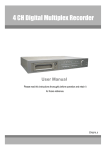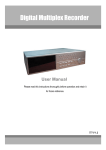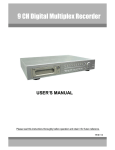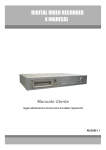Download Manual - CPcam
Transcript
Evolution for your Demand http://www.cpcamcctv.com Digital Video System USER’S MANUAL Please read the instructions thoroughly before operation and retain it for future reference. CPD577W V1.0 Evolution for your Demand WARNING WARNING All the safety and operating instructions should be read before operation. The improper operation may cause permanent damage. • Please use the provided adaptor (Other adaptor is not suitable for this machine). • Please lift and place this equipment gently. • Do not expose this equipment to open sunlight. • Do not use this equipment near water or in contact with water. • Do not spill liquid of any kind on the equipment. • Please power down the unit before unplugging. • Do not switch the Power On & Off within short period of time (within 3 seconds). • Do not attempt to have this equipment serviced by yourself. • Installation should be made by qualified service personnel. The lightning flash with arrowhead symbol, within an equilateral triangle, is intended to alert the user to the presence of uninsulated "dangerous voltage" within the product's enclosure that may be of sufficient magnitude to constitute a risk of electric shock to persons. The exclamation point within an equilateral triangle is intended to alert the user to the presence of important operating and maintenance-(servicing) instructions in the literature accompanying the appliance. Evolution for your Demand TABLE OF CONTENTS What Do You Get ? • FEATURES -------------------------------------------------------------------------------------- 1 • PACKAGE CONTENT ------------------------------------------------------------------------ 1 Before Operation • INSTALLATION GUIDE ---------------------------------------------------------------------- 2 • FRONT PANEL ---------------------------------------------------------------------------------- 3 • BACK PANEL ----------------------------------------------------------------------------------- 5 Basic Operation • GETTING STARTED---------------------------------------------------------------------------- 6 • OPERATION -------------------------------------------------------------------------------------- 6 Detailed Menu Setup • MENU TREE-------------------------------------------------------------------------------------- 8 • ACCESS MENU --------------------------------------------------------------------------------- 9 • MAIN MENU -------------------------------------------------------------------------------------- 9 • MENU OPTIONS -------------------------------------------------------------------------------- 10 • MOTION DETECTION ------------------------------------------------------------------------- 15 Evolution for your Demand TABLE OF CONTENTS Network Setting Guide • HARDWARE CONNECTION AT DVS SIDE -------------------------------------------- 17 • STATIC IP SETTING -------------------------------------------------------------------------- 18 • DYNAMIC IP SETTING ------------------------------------------------------------------------ 22 • SOFTWARE OPERATION --------------------------------------------------------------------- 34 • BASIC SOFTWARE OPERATION ----------------------------------------------------------- 35 •PLAYBACK OPERATION---------------------------------------------------------------------- 37 •ADVANCED SETTING-------------------------------------------------------------------------- 38 •CONNECT VIA IE BROWSER---------------------------------- ------------------------------ 41 4 Advanced Operation • OPERATION OPTIONS ----------------------------------------------------------------------- 43 • KEY LOCK ---------------------------------------------------------------------------------------- 44 • TROUBLE SHOOTING-------------------------------------------------------------------------- 44 • SPECIFICATIONS ------------------------------------------------------------------------------- 45 Appendix • APPENDIX #1 – INSTALL HDD--------------------------------------------------------------- 46 • APPENDIX #2 – RACK MOUNT--------------------------------------------------------------- 48 • APPENDIX #3 – RECORDING SPEED------------------------------------------------------ 49 • APPENDIX #4 – PIN CONFIGURATIONS-------------------------------------------------- 50 Evolution for your Demand What Do You Get ? FEATURES DVS Features •Remote control via the Internet •Wavelet Compression Format replaces Time-Lapse VCR + Multiplexer • 4 Audio inputs / 2 Audio outputs • On Screen Display and RTC (Real time clock) Function • Support from 4 channels to 7/9/10/13/16 channels video inputs • Picture-In-Picture (PIP) is available in live and DVS playback modes • Motion detection function and 4 level video quality adjustable on each channel • Alarm Input & Output Function • Video loss detected on each channel can record up to 160 events • Power-loss memory function • Support 2 Removable HDDs, IDE Type • Quick Multiple Search by date/time, alarm, full list • Security password protection PACKAGE CONTENT Digital Video System (with HDD cartridge) Accessories pack User’s Manual 2 Keys for Cartridge CD-ROM Power Adapter and Cord NOTE : Please check the package to make sure that you receive the complete accessories which includes the components shown above. 1 Evolution for your Demand INSTALLATION GUIDE Before Operation 1. Connect cameras and monitor with the DVS. 2. Shown below is one example for connecting the DVS to your existing Observation System. 3. Install HDDs (The compatible HDD Brands are listed in the following table.) Please refer to page.46 Appendix #1 for installation instructions. The HDDs must be installed before the DVS is turned on. Alarm Sensor Main Monitor Audio Speaker Power Camera 1 Camera 16 Call Monitor COMPATIBLE HARD DISK BRANDS Manufacturer Model Capacity Rotation HITACHI HITACHI HITACHI Deskstar 180 GXP (120 GB) Deskstar 7K250, HDS722516VLAT20 Deskstar 7K250, HDS722525VLAT80 120GB 160GB 250GB 7200 rpm 7200rpm 7200rpm IBM IBM Maxtor Deskstar 120GXP (80GB) Deskstar 120GXP (120GB) DiamondMax 536DX(60GB) 4W060H4 80GB 120GB 60GB 7200 rpm 7200 rpm 5400rpm Maxtor Maxtor Maxtor Seagate Seagate DiamondMax Plus 9 DiamondMax Plus 9, Model#6Y120L DiamondMax Plus 9, Model#6Y160L0 Barracuda ATA IV, ST380021A Barracuda ATA V, ST3120023A 80GB 120GB 160GB 80GB 120GB 7200 rpm 7200 rpm 7200rpm 7200rpm 7200 rpm Seagate Barracuda 7200.7 Plus, ST3160023A Western Digital Caviar WD1200BB-00CAA1 160GB 120GB 7200 rpm 7200rpm Western Digital Caviar WD2000BB-00DWA0 200GB 7200rpm 2 Evolution for your Demand FRONT PANEL 1 3 2 5 4 7 6 9 8 11 10 13 12 15 14 Up 16 Left MENU ENTER SELECT ZOOM SLOW HDD Right REC HDD ALA RM TIME R PLAY REC Full POWER Down 1. REMOVABLE HDD CARTRIDGE Please refer to page.46 Appendix #1. 2. MENU Press MENU button to enter main menu. 3. ENTER Press ENTER button for confirmation. 4. ZOOM Press ZOOM button to enlarge the picture display. 5. Press PIP button for Picture in Picture screen. 6. SLOW To slow down speed of play mode. 7. SELECT Press SELECT button to select appointed camera (1~16) to display on full screen mode. 8. 4 channels display mode 3 Evolution for your Demand 9. 7, 9, 10, 13 channels display mode 10. 16 channels display mode 11. LED LIGHT The LED Light is ON under the following conditions. •HDD : HDD is activated •HDD Full : HDD is full •ALARM : If you want to turn off the ALARM LED light, please refer to page.13 and set the Camera / ALARM item as OFF. (all of the cameras should be set as OFF.) •TIMER : When Timer is set as Enabled •PLAY : On Play mode •REC : On Recording mode 12. CAMERA (1-16) Press the Camera Select (1-16) to select specified camera. 13. REC Press REC to start recording. 14. REW / LEFT •REW : Under DVS play mode, it can play video backward at different speeds. (Press REW again to adjust speed as 1, 2, 4, 8, 16, 32 times) •Left : Under setup mode, it works as Left button. 15. PLAY Press PLAY to play recorded video. 16. STOP / DOWN •STOP : Under DVS Record / Play mode, it can stop the action. •DOWN : Under setup mode, it works as Down button. 17. PAUSE / UP •Pause : Under DVS play mode, it can pause the action. •UP : Under setup mode, it works as Up button. 18. FF / Right •FF : It can play video forward at high speed, and press FF again to adjust speed from 1, 2, 4, 8, 16, 32 times. •Right : Under setup mode, it can work as Right button. 19. POWER Press Power to turn ON / OFF the DVS. 4 Evolution for your Demand REAR PANEL 8 6 7 5 4 1 2 3 10 9 1. POWER Please use the provided adaptor to connect power cord (Other adaptors are not suitable for this machine). 2. EXTERNAL I/O •Controlled remotely by an external device or control system. •Alarm input, external I / O explanation. 3. 75Ω / HI When using Loop function, please switch to HI. If you don’t use Loop function or disconnect the video input, please set it as 75Ω. 4. VIDEO INPUT (1-16) Connect to video source, such as camera. 5. LOOP (1-16) Connect video signal between Input port and Loop port to make a loop. 6. AUDIO IN (1-4) Connect to audio source, such as microphone. •IPS should be set to 25A (for NTSC) or 18A (for PAL) ✻ 4 audio inputs, but users can only select 1 for recording. 7. AUDIO OUT (R/L) Connect to monitor or speaker. •IPS should be set to 25A (for NTSC) or 18A (for PAL) ✻ with 2 mono audio outputs from the same source. 8. MONITOR Connect to Main monitor. 9. CALL Connect to CALL monitor. Show the Switch Display. When the alarm is triggered, the call monitor will show the triggered channel for a period of time. 10.LAN Connect Internet by LAN cable. 5 Evolution for your Demand GETTING STARTED Basic Operation Before using the DVS, please have the HDDs installed ready. (refer to Appendix #1 for installation or removal of HDDs). 1. Connect the AC Power Cord with Power Adapter and plug into an electrical outlet. The Red LED indicator light will be ON and the DVS is in Standby mode. 2. Press the Power button. The POWER LED will turn from red to orange, and other red LED indicators will turn ON. It takes approximately 5 to 15 seconds to boot the system with the message : “ HDD Detecting ”. On connecting, the POWER LED will change to green color, and the Alarm LED will be ON. 3. Before operating the DVS, please set up the system time first. (for setting system time, please refer to page.12). NOTE : When “HDD not found” message shows up, please refer to appendix # 1. It may result from the improper installation of the HDD. OPERATION RECORDING The DVS offers a variety of recording modes, such as continuous recording, scheduled time, or by events. You can set up recording speed and resolution. You can set these options by selecting MENU / RECORD before recording, please refer to page.13. Under the recording status, if power is off accidentally, recorded video will still be stored in the HDDs. DVS will return to original recording situation after power is on again. On the screen, you will find the date, time, HDD recording type, the amount of available GB left in the HDDs memory and the letter “M” represents the method of recording that is occurring. 2002 – JAN –01 01:02:03 (OW : HDD Overwrite) M● 032GB 080GB NOTE : 1. When the HDDs are full under O/W Recording mode, previous recorded files may be overwritten without further warning notices. 2. XXGB on the left side means the left space in the Master HDD and that at the right side means the left space in the Slave HDD. 3. If the HDD’s capacity is only 5 GB left, it will buzz for 3 seconds; so as in 4GB, 3GB, 2GB and 1GB. If the O/W Recording mode(NOTE 1) is on, it won’t have the warning buzzer. There are 4 recording modes in which Recording can occur : Alarm, Timer, Manual and Motion Trigger. 1. ALARM RECORDING DVS is triggered by an alarm input. Indicated by the letter “A” and will show diagram on the triggered channel. 2. TIMER RECORDING Recording is scheduled by a Timer. Indicated by the letter “T”. 3. MANUAL RECORDING Recording is initiated by manually pressing the REC button. Indicated by the letter “M”. 4. MOTION TRIGGER RECORDING Recording is triggered by motion detection. Indicated by the letter “D”. And show 6 diagram on the triggered channel. Evolution for your Demand PLAY Press “ PLAY ” button, the DVS will show the last recording. 1. FAST FORWARD (F.F. ) & FAST REWIND (F.R.) You can increase speed for Fast Forward and Rewind on the DVS. In the Play mode, press ” ►► ” once to get 2X speed forward and press twice to get 4X speed,… and the maximum speed can reach 32X. Press ”◄◄ ” once to get 1X speed rewind and press twice to get 2X speed, … and the maximum speed can reach 32X. 2. SLOW FORWARD (S.F.) & SLOW REWIND (S.R.) You can also slow down the speeds of Forward and Rewind on the DVS. In the Play mode, press the SLOW button and you will enter Slow mode. Press ” ►► ” once to get 1/2X speed forward and press twice to get 1/4X speed,… and the slowest speed can reach 1/32X. Press ”◄◄ ” once to get 1/2X speed rewind and press twice to get 1/4X speed, … and the slowest speed can reach 1/32X. 3. PAUSE It will let you pause the current image displayed on the screen. 4. STOP Press “ STOP ” button under all circumstance, it will return DVS to live monitoring mode. 5. IMAGE JOG DIAL It will allow you to manually view video frame-by-frame, one image at a time. While in PLAY mode, press “ PAUSE ”, it will pause the screen. Press “ ►► ” button to advance the frozen screen one image forward. Press “ ◄◄ ” button to move back one image. CAMERA SELECT (1--16) Press Camera Select (1-16) to select appointed camera to display on full screen mode. 7 Evolution for your Demand Detailed Menu Setup MENU TREE MENU SEARCH TIMER RECORD CAMERA SYSTEM EVENT NETWORK LAST RECORD DAY HDD OVERWRITE TITLE AUDIO INPUT SEVER IP FULL LIST START RECORD IPS DWELL INT AUDIBLE ALARM GATEWAY ALARM LIST END RECORD QUALITY Brightness / Contrast / Color EXT AUDIBLE ALARM NET MASK MOTION LIST QUALITY ALARM REC IPS ALARM MOTION AUDIBLE ALARM DNS TIME SEARCH IPS ALARM REC QUALITY RECORD ALARM DURATION WEB PORT TIMER ENABLE MOTION TRIGGER RECORD DWELL TIME RESET DEFAULT MESSAGE LATCH TITLE DISPLAY TIME DISPLAY TIME NEW PASSWORD CLEAR HDD SYSTEM RESET 8 Evolution for your Demand ACCESS MENU The Menu allows you to configure your DVS settings. Please follow the steps below to access the Menu : Press the Menu button. The password screen will appear: Password: 0000 NOTE : The default Password is 0000. Press the Enter button to access the Menu. To key-in the Password, press the “Right” and “Left” buttons to move between numbers, and use the “Up” and “Down” buttons to input the number. Press the ENTER button once the correct Password is entered. The MENU options screen will appear. Note: If you get a message “Password Error”, you might enter an incorrect password. MAIN MENU There are 7 options available in the Main Menu: (MENU) ► SEARCH TIMER RECORD CAMERA SYSTEM EVENT NETWORK SEARCH -------- Find recorded list TIMER ---------- Scheduling Record RECORD ------- Record Mode Setup CAMERA ------- Camera Channel Setup SYSTEM -------- System Setup EVENT ---------- Event List NETWORK------Network Setup Outlined below are the buttons used for Menu setting : •“Up” and “Down” : Scroll up and down or change values when an option is selected and is blinking •“Left” and “Right” : Scroll sideways within a menu option that has been selected •ENTER : Selects a submenu / an option under a submenu for browsing / modification •MENU : Completes modification of a menu option and exits a menu 9 Evolution for your Demand MENU OPTIONS SYSTEM 1. AUDIO INPUT To choose one of 4 channels to record. (can only select 1 during operation for recording) 2. INT AUDIBLE ALARM To set the INTERNAL AUDIBLE ALARM. It will be trigged by event occurrence when the setting is ON. 3. EXT AUDIBLE ALARM (MENU) SEARCH TIMER RECORD CAMERA ►SYSTEM EVENT NETWORK To set the EXTERNAL AUDIBLE ALARM. It will be trigged by event occurrence when the setting is ON. 4. MOTION AUDIBLE ALARM (SYSTEM) To set the MOTION AUDIBLE ALARM. It will be trigged by motion detection occurrence when the setting is ON. ► AUDIO INPUT : 1 INT AUDIBLE ALARM : ON EXT AUDIBLE ALARM : ON 5. ALARM DURATION MOTION AUDIBLE ALARM : ON Set the reaction time which was determined by the length of alarm mode responded to a buzzer. Default setting is 10 sec. Options are 10 SEC, 15 SEC, 20 SEC, 30 SEC, 1MIN, 2MIN, 3 MIN, 5 MIN, 10 MIN, 15 MIN, 30 MIN, ALWAYS. ALARM DURATION : 10 SEC DWELL TIME : 02 SEC MESSAGE LATCH : NO TITLE DISPLAY :ON TIME DISPLAY : Y/M/D 6. DWELL TIME DWELL TIME is the time period that each channel sequentially shown on call monitor. 7. MESSAGE LATCH 2003-JAN-02(THU) 17:37:09 NEW PASSWORD : XXXX CLEAR HDD : NO SYSTEM RESET : NO To select whether the DVS messages will disappear after 10 sec or remain on screen. NO is the default setting which the messages will go away after 10 sec. NOTE : Video loss, Alarm and Motion messages will be shown the same as Alarm Duration time. 8. TITLE DISPLAY To set the title shown on monitor or not. 9. TIME DISPLAY To set the time format on the DVS. 10. TIME To set the correct time on the DVS. 10 Evolution for your Demand 11. NEW PASSWORD : XXXX (Default password : 0000) To set the new password. 12. CLEAR HDD Delete all the contents of your HDD. When you choose “YES” on this option, you will be prompted with the question shown : Press “►” to clear HDD or press ”◄” not to clear HDD. ALL DATA IN HDD 13. SYSTEM RESET WILL BE CLEARED Reset the system to book to the factory default settings. ARE YOU SURE? (◄ : NO ► : YES ) SEARCH Press ”ENTER” to confirm SEARCH setup, and the screen will show the following options. 1. LAST RECORD Play the last recorded video. 2. FULL LIST Show a listing of all recorded video sorted by time on the HDD. D : Motion Recording M : Manual Recording time A : Alarm Recording time T : Timer Recording time M-HDD : Storage in Master HDD S-HDD : Storage in Slave HDD 3. ALARM LIST Show a listing of all recorded video triggered by an Alarm. NOTE : If there is no Alarm recorded, the screen will display “EMPTY”. ►M M A T D M T D (MENU) ► SEARCH TIMER RECORD CAMERA SYSTEM EVENT NETWORK 2002-JAN-01 02:32:03 M-HDD 2002-JAN-03 01:02:03 M-HDD 2002-JAN-05 21:12:24 M-HDD 2002-JAN-12 12:57:38 M-HDD 2002-JAN-13 16:16:39 S-HDD 2002-JAN-15 23:55:23 S-HDD 2002-JAN-22 18:22:13 M-HDD 2002-JAN-25 12:52:03 S-HDD ◄: PAGE UP ►: PAGE DOWN 4. MOTION LIST Show a listing of all triggered motion detections. 5. TIME SEARCH Find video recorded on a specific date that is entered. 11 (SEARCH) ►LAST RECORD FULL LIST ALARM LIST MOTION LIST TIME SEARCH Evolution for your Demand TIMER 1. DAY Select the day, or days of the week (Mon–Fri / Sat-Sun / Daily) that you wish to schedule the DVS to auto recording. NOTE : 1.Special Date could be changed by “Enter”, “Up” and “Down” buttons. 2. If you have selected the specific date and recording timer set from that specific day to a new day, then the Recording Timer Schedule will be set as a whole week. For specific date of Recording Timer Schedule, it is not recommended to set End Time over 23:59. For Example:If you set Timer Schedule Day as Sunday, and START from 11:30, but End on 00:20, then Recording Timer Schedule is set as from every Sunday's 11:30 to next Sunday's 00:20. If you only want to set Recording Timer Schedule from every Sunday 11:30 to Monday 00:20, then you should set Recording Timer Schedule as Sunday from 11:30 to 23:59, and Monday from 00:00 to 00:20. 2. START Select the starting time for the recording. 3. END Select the finishing time for the recording. 4. QUALITY Select the image quality for the recording. There are four Quality settings : BEST, HIGH, NORMAL and BASIC. (MENU) SEARCH ►TIMER RECORD CAMERA SYSTEM EVENT NETWORK 5. IPS Stand for Images Per Second and it could let you see Record submenu for more details. (TIMER) NTSC-25A、15、08、04、02、01 DAY START END QUALITY PAL-18A、12、06、03、02、01 DAILY 00:00 00:00 BEST NOTE : “A” means “ Record with Audio”. DAILY 00:00 00:00 BEST DAILY 00:00 00:00 DAILY 00:00 00:00 DAILY 00:00 00:00 DAILY 00:00 00:00 DAILY 00:00 00:00 TIMER ENABLE : NO 6. TIMER ENABLE Enables / disables Timer recording function. 12 BEST BEST BEST BEST BEST IPS 25A 25A 25A 25A 25A 25A 25A Evolution for your Demand RECORD 1. HDD OVERWRITE Select “YES” to overwrite previous recording video in HDD. NOTE : When the HDD is full under O/W Recording mode, previous recorded files may be overwritten without further warning notices. 2. RECORDING IPS Select the images per second of recording. The options are as following : NTSC-25A、15、8、4、2、1 PAL-18A、12、6、3、2、1 NOTE : “A” means “Record with Audio ”. 3. RECORDING QUALITY There are four quality settings : BEST, HIGH, NORMAL and BASIC. (MENU) SEARCH TIMER ► RECORD CAMERA SYSTEM EVENT NETWORK (RECORD) ► HDD OVERWRITE: NO RECORD IPS: 25A RECORD QUALITY : NORMAL ALARM REC IPS: 25A ALARM REC QUALITY : HIGH MOTION TRIGGER RECORD: ON 4. ALARM REC IPS Select the images per second of recording during an Alarm. The options are as following : NTSC-25A、15、8、4、2、1 PAL-18A、12、6、3、2、1 NOTE : “A” means “ Record with Audio”. 5. ALARM REC QUALITY There are four quality settings during an Alarm : BEST, HIGH, NORMAL and BASIC. 6. MOTION TRIGGER RECORDING When you set up the MOTION DETECTION function (Please refer to Page.15 for MOTION DETECTION SETUP), 1. Select “ON” to set up the motion trigger recording: It can automatically switch from stand-by mode to Recording Mode. The motion detection will change the scanning sequence and shows and “D” on the monitor. NOTE: The trigger recording time will depend on ALARM DURATION mode setting (Please refer to page.10 for ALARM DURATION) and it will record from the last trigger time. For example, when the alarm duration setting is 1 min, the time recording time is from 9:00:00 to 9:01:00. If the motion detection trigged again at 9:00:40, the trigged recording time will from 9:00:00 to 9:00:40 and 9:00:40 to 9:01:40. The total recording time is 00:01:40. 2. Select ”OFF”: The screen shows “M”on the monitor. , the motion detection will change the scanning sequence while in recording mode and shows CAMERA 1. TITLE Assign a six-characters title to each camera input. Initially each title is the camera’s max number. 2. DWELL Select “ON” to set up the channel auto switching on the call monitor. 3. (Brightness) / (Contrast) / (Color) Have a video adjustment (Brightness / Contrast / Color) of each channel. The level is from 0 to 9. 4. ALARM Select LOW / OFF / HIGH for alarm polarity. The default value is LOW. 13 (MENU) SEARCH TIMER RECORD ► CAMERA SYSTEM EVENT NETWORK Evolution for your Demand 5. RECORD Set up which channel you want to record during alarm trigger. The DVS record methods are as below : EVENT : when alarm input is triggered, DVS will record alarming channel more frequently. For example : when CH01 is triggered, the recording method will become 1-2-1-3-1-4…. NORMAL : when alarm input is triggered, DVS will record normally as set up. OFF : when alarm input is triggered, DVS will not record. NETWORK Press the “▲” “▼” ”◄” “►” buttons to move the cursor. Press the “+” “-” buttons to change the digit. Press the “MENU” button to confirm the changes/ to exit the menu. Set IP ADDRESS, GATEWAY, NET MASK, DNS and PORT. Choose YES in RESET DEFAULT will go back to default value of NETWORK. (MENU) SEARCH TIMER RECORD CAMERA SYSTEM EVENT ► NETWORK (NETWORK) SERVER IP 192.168.001.010 GATEWAY 192.168.001.065 NET MASK 255.255.255.000 168.095.001.001 DNS WEB PORT 00080 RESET DEFAULT NO 14 Evolution for your Demand MOTION DETECTION MOTION DETECTION SETUP 1. Press “ MENU “ to enter the menu set up, then “ Down ” to CAMERA setup. 2. Press “ENTER” twice to enter the Motion Detection Setup. 3. Each screen displays the current camera picture overlaid with the motion targets (as Figure 1). You can push the button “ Left ” or “ Right ”, ” Up ” or “ Down ” to adjust motion detection in ON or OFF. 4. The targets on each motion setup can be turned to ON or OFF individually. To set up targets, using the front panel buttons: àPress “ENTER” to confirm the channel àPress “ENTER” to enter motion mode •▲ Up -- moves the target cursor up one row at a time. •▼ Down -- moves the target cursor down one row at a time. •◄ Left -- moves the target cursor left one column at a time. •► Right -- moves the target cursor right one column at a time. àPress “ENTER” to turn the target cursor ON and press “ENTER” again to turn the target cursor OFF. (Figure 1-1) •Zoom – turns all targets in the current row ON or OFF. (Figure 1-2) •PIP – turns all targets on the screen ON or OFF. (Figure 1-3) 5. Press “ SLOW “ button to setup the Sensitivity list up to 255 and “ REC “ button to setup the Sensitivity list down to 000. The default value is set on 32. NOTE : Sensitivity value is related to motion and brightness change. Low value (as 001) means higher sensitivity on motion and brightness change. High value (as 255) means lower sensitivity on motion and brightness change. User can choose the suitable sensitivity value in different locations. NOTE : When motion trigger recording setting is ON, it can automatically switch from stand-by mode to record mode.The motion detection will change the scanning sequence and shows on the monitor. There will be an action as following: For example : If the motion is detected on Camera #1, its recording & scanning sequence will be more frequent. The sequence will be as 1st, 2nd, 1st, 3rd, 1st, … 16th. And channel 1 will show on the screen. If 2nd camera and 3rd camera both motion detection are activated, they will be scanning as 1st, 2nd, 3rd, 2nd, 2nd, 3rd, 3rd, 2nd, 3rd, 4th, 2nd, 3rd … and vice versa. And CH2 & CH3 will show for a period of time which is same as Alarm Duration time. 15 Evolution for your Demand Figure 1-1 MOTION DETECTION SETUP — 1~15 Figure 1 MOTION DETECTION SETUP 1 2 3 4 5 6 7 8 9 10 11 12 13 14 1 15 2 3 4 5 6 7 -- -- -- -- -- -- -- -- -- -- -- -- -- 2 3 4 5 6 7 8 9 10 11 12 -- -- -- -- -- -- -- 13 14 15 1 2 3 4 5 6 -- -- -- -- -- -- -- 7 11 12 13 14 15 -- -- -- -- -- -- -- -- 8 9 10 11 12 13 14 15 032 032 -- 10 Figure 1-3 MOTION DETECTION SETUP-- ALL Figure 1-2 MOTION DETECTION SETUP-- LINE 1 9 032 032 -- 8 -- -- -- -- -- -- -- -- -- -- -- -- -- -- -- -- -- -- -- -- -- -- EVENT There are only 16 recorded events will be shown on a single page and please press “◄ ” or “► ” to change the pages or press ▲ + ▼ to CLEAR the EVENT record. M-HDD WARNING: Master HDD might be failed. M-HDD LOSS: Master HDD does not exist. Now user can use the other HDD. M-HDD ERROR: Master HDD might be error S-HDD WARNING: Slave HDD might be failed S-HDD LOSS: Slave HDD does not exist. Now user can use the other HDD. (MENU) SEARCH TIMER RECORD CAMERA SYSTEM ► EVENT NETWORK S-HDD ERROR: Slave HDD might be error HDD FULL: HDD is full SYSTEM ERROR: System might be failed ----02 VLOSS: Channel: 2 Video loss ----03 ALARM: Channel: 3 External I/O Alarm have triggered POWER RESTORE : Power restore 16 M–HDD WARNING 2002-JAN-01 03:00:00 M–HDD LOSS 2002-JAN-01 03:00:00 M–HDD ERROR 2002-JAN-01 03:00:00 S–HDD WARNING 2002-JAN-01 03:00:00 HDD FULL 2002-JAN-01 03:00:00 SYSTEM ERROR 2002-JAN-01 03:00:00 ----02 VLOSS 2002-JAN-01 03:00:00 ----03 ALARM 2002-JAN-01 03:00:00 ◄: PAGE UP ►: PAGE DOWN ▲+▼: CLEAR -- Evolution for your Demand Network Setting Guide HARDWARE CONNECTION Direct Connect with PC PC CAMERA MONITOR Remote Connect Via Internet CAMERA PC MONITOR 17 Evolution for your Demand STATIC IP SETTING STEP1: Software installation 1.Put the attached CD into a CD-ROM and it will start to install the application program on Windows PC. 2. Press “Next”. 3.Choose destination location and press “Next”. 18 Evolution for your Demand 4.Set program shortcuts setting and press “Next”. 5.Press “Next” to copy files 6.After the installation, there are 6 files and 1 folder in your assigned path (file folder) as below. 19 Evolution for your Demand Step2 : Static IP setting In DVS MENU / NETWORK set IP ADDRESS, GATEWAY, NET MASK, DNS and WEB PORT which are provided from your local ISP ( internet service provider ). (MENU) SEARCH TIMER RECORD CAMERA SYSTEM EVENT ► NETWORK For example (NETWORK) SERVER IP 61.66.138.74 61.66.138.254 GATEWAY 255.255.255.000 NET MASK 168.095.001.001 DNS WEB PORT 00080 RESET DEFAULT NO After all network settings are finished, please connect DVS to internet. Internet Static IP 20 Evolution for your Demand Step3 : Connect PC and DVS via the internet Click twice and enter your User name, Password (Note : If you never change the “Account” before, the default user name and password are both “admin”) and Server IP which you have set to DVS in step 2. Then click OK to connect. 21 Evolution for your Demand DYNAMIC IP SETTING Step1 : Software installation 1.Put the attached CD into a CD-ROM and it will start to install the application program on Windows PC. 2. Press “Next”. 3.Choose destination location and press “Next”. 22 Evolution for your Demand 4.Set program shortcuts setting and press “Next”. 5.Press “Next” to begin copying files 6.After the installation, there are 6 files and 1 folder in your assigned path (file folder) as below. 23 Evolution for your Demand Step2 : DDNS apply 1. Click on free site “http://www.dyndns.org” ( please look at the example below, you can also apply DDNS in other DDNS web page) and “ACCOUNT” 2. Press “Create Account” 24 Evolution for your Demand 3. Register the information and click on “Create Account” 4.After registering your account, you will receive an e-mail, which contains instructions to activate your account. If you do not follow these directions within 48 hours, you will need to re-register your account. 5.Login your account. 25 Evolution for your Demand 6.Click on“Account” and “Add Host” 7 Users can set up their own DDNS HOST. For example, the user’s applied Host name is “TEST”. And then press “Add Host” to finish the setting. (NOTE : Some routers don’t support some DDNS HOST) TEST Step3 : Login router NOTE : The following settings are different from router to router. Please read the instruction of your router thoroughly. 1.Connect PC and router (LAN end) LAN end POWER 26 Evolution for your Demand 2. Network setting for PC. (The instruction is based on Win XP O/S. If your O/S is Win 2000 or Win 2003, the setup procedure is similar to that of Win XP O/S.) Click 3.Click “Properties” for TCP/IP setup 27 Local Area Connection Enabled Realtek RTL8139 Family twice Evolution for your Demand 4.Click on “INTERNET PROTOCAL (TCP/IP)” , then select “Properties” to setup 5.Choose “Obtain an IP address automatically” . . . 6. Enter “Command Prompt” 28 . . . . . . Evolution for your Demand 7. In the setting window, type “ ipconfig” to find out router’s gateway(e.q. 192.168.1.1) 8. Close the window in the above step. Enter the IP address ( router’s gateway : 192.168.1.1 ) to log in to the router from internet explore. And then enter the login web page and key in the router’s user name and password. 29 Evolution for your Demand Step4 : Router setting NOTE : In the router setting, we have four steps as follows. 1. Dial setting 2. DHCP setting 3. Virtual server setting 4. DDNS setting (◇ The following settings will differ from router to router. Please refer to the user’s manual of router) 1.Press “INTERNER PORT” and choose your WAN type (e.q. PPPoE), and then enter your “User Name” and “Password” of dialing up to dynamic IP. Press save after you finish the set up. TEST 2. Press “LOCAL PORT” and set “Start IP address” and “Number of IP address”. (For example, if the IP address of DVS is 192.168.1.10, then 10 is excluded from the setting range) Press save after you finish setting up. 30 Evolution for your Demand 3. In “ADVANCED SETUP / Virtual Server”. Choose “By Port” and set “Port Number” to 80 for DVS. And set “Local Server IP Address” to 192.168.1.10. Press add after you finish the set up. 4. In “ADVANCED SETUP / Dynamic DNS”. Key in the “DNS Account”, “User Name” and “Password” that you applied in step 3. Press save after you finish the set up. TEST 31 Evolution for your Demand Step 5 : IP setting In DVS MENU / NETWORK set SERVER IP, GATEWAY, NET MASK, DNS and WEB PORT. For example (NETWORK) SERVER IP 192.168.001.010 GATEWAY 192.168.001.065 NET MASK 255.255.255.000 DNS 168.095.001.001 WEB PORT 00080 RESET DEFAULT NO (MENU) SEARCH TIMER RECORD CAMERA SYSTEM EVENT ► NETWORK Step6 : Connect router ADSL modem (WAN end) Step7 : Connect to DVS via internet 1. Change PC network setting to the original setting and link PC to the internet. 2. Click twice and enter your User name, Password and host (Note : The default User Name and Password are both “admin”). Then click OK to connect. Backup Program Play the last record file admin test.dydns.org 32 Evolution for your Demand NOTE: There are two ways to get the software, one is via attached CD, and the other is via Video Web Server.(Refer to P.41~42) vAddress Book You can press “Address Book” button to add a new IP or choose any logined IP address to access the Video Server. This function is designed to store the list of IP addresses which you can control and manage. vBackup Program You can press “ ” button and you can backup all related files of this application program to any storage device that you want (for example: any hard disk or USB Flash Drive). vPlay last record file You can press “ ” button and you can play the last record file. Note of Dynamic IP setting *In step 2.7 : Some routers don’t support some DDNS HOST. *In step 3.1 : Please use router’s LAN end to connect PC. *In step 3.8 : Please use IE browser to enter router’s gateway. *In step 4.1 : Please make sure that you have pressed save after setting. *In step 4.2 : Please make sure that you have pressed save after setting. *In step 4.3 : Please make sure that you have pressed add after setting. *In step 4.4 : Please make sure that you have pressed save after setting. *In step 6 : Please use router’s LAN end to connect to DVS. Use WAN end to connect to ADSL modem. *In step 7 : The Server IP is the DDNS HOST which you set in step 4.4. 33 Evolution for your Demand SOFTWARE OPERATION Follow the steps for connection at your client site (remote site). (e.g. If you set up the server at your office with one static IP, you can remotely proceed to watch the video anywhere with a networked computer.) Step 1:Click twice to enter Login setup (please refer to “software installation”) Step 2:Key in “User Name” and “ Password”. Click “OK” to establish the connection. For example Step 3:If you could see the video screen as following, you have been successfully connecting to the server. 34 Evolution for your Demand BASIC SOFTWARE OPERATION A. Video Web Server control panel 3 2 4 5 6 7 1 1. Image transmission rate per second 2. Data transmission rate 3. Connection/Disconnection 4. Resolution : D1、CIF 5. Image quality : High、Middle、Low 6. Image adjusting : Brightness/ Contrast/ Saturation 7. Snapshot : press this button, the image will be automatically saved in the PC. 8. Record : press this button, the recording file will be saved in the PC automatically. 9. System Config 10. Number of online users 35 8 9 10 Evolution for your Demand B. Digital device control panel 6 1 2 3 4 6 1. CH1-16, 2. 4cut, 7cut, 9cut, 10cut, 13cut,16cut, PIP 3. Zoom, Select, Lock, Record 4. Stop, Rewind, Fast Forward, Pause, Slow, Play 5. Menu(Exit), Left, Right, Up, Down 6. Enter 7. TURBO uNOTE: After you press the record icon, there will be a recording file in the path that you have set.Each recording file can be save up to 6000 frames. The recording file will be assigned to the second File if it is more than 6000 frames. Besides, if the HDD space is less than 200MB, the program will stop recording. 36 5 Evolution for your Demand PLAYBACK OPERATION Please find a recording file in the PC and click twice on it to playback. 1 2 3 4 5 6 7 8 9 10 11 12 13 20% CH1 2004/12/15 09:49:38 2004-DEC-15 [WED] 09:49:33 Ad 001.4 GB O/W NTSC_CIF 219.84.21.166 1. On Screen Display 8. OSD show / hide 2. Snapshot 9. Config setting (Path of snapshot, text color, progress 3. Stop color, channel color) 4. Pause 10. Open Last File 5. Slow (1/2X, 1/4X, 1/8X, 1/16X, 1/32X) 11. Open Next File 6. PLAY 12. Duration time / Status 7. Fast (2X, 4X, 8X, 16X, 32X) 13. Playback controlling bar 37 Evolution for your Demand ADVANCED SETTING Click “System Config” for advanced setting. NOTE : Apply-After changing all setting, press “apply” to refresh the data. Reboot-Press this button to restart the server. SYSTEM CONFIG ACCOUNT Set up the user’s account( Max 10 accounts) , password and authority ( Max 6 accounts on line at the same time) . 1.User’s level: SUPERVISOR-control all the functions HIGH LEVEL-control advanced functions NORMAL -control basic functions only GUEST LEVEL –watch the image only 2.Life time : During the period of time, users are allowed to control the Video Web Server. ALARM Set up the ALARM function. You can use it to operate “alarm trigger recording” function. 1.Alarm Trigger: Enable or disable Alarm trigger function. 2.Alarm Method : Two selections—E-mail or FTP. 3.Image Resolution : Image storing resolution for Email or FTP function (CIF is 176 *144 ; D1 is 352*288) 4.Alarm refresh : Clean the alarm message “ ” which is showed on the screen. * When the motion detection is triggered, the DVS will issue the alarm sound to notify the users. 38 Evolution for your Demand MAIL When the alarm is triggered, the video server program will capture the instant picture and e-mail the captured image to the assigned recipients. 1.You can get all the data from the ISP company or by mailing to the server supplier.(POP3/SMTP server) 2.You should set the mail list which you want to send to when the alarm is triggered. 3.If it is not necessary for you to verify password and user’s name, please choose Verify as “No”. FTP When the alarm is triggered, the video server program will capture the instant picture and upload the captured image to the assigned FTP site. 1.You can get all the data from your MIS department. 2.The default uploading port is No.21. 3.You can set the uploading directory. File Path You can modify the storing path for recording file and snapshot images. C:\Documents and Settings\bowbow.huang\desktop C:\Documents and Settings\bowbow.huang\desktop 39 Evolution for your Demand TOOLBOX Upgrade the firmware and get the online users’ information. NOTE :Do not reboot the DVS while it is upgrading the firmware. 1.Firmware Version : The current firmware version. You can click on “Find” button to get the latest firmware from PC and press “Upgrade Firmware” to upgrade it. 2.Turbo Step:Activate the turbo button when you would like to shift the selections more quickly by jumping 6 selections at a time. Online User The information of online user. Info Refresh: It can refresh the users’ information. 40 Evolution for your Demand CONNECT via IE BROWSER You can also connect Video Web Server via browser. This function is suitable in both WIN 2000 and WIN XP ( WIN XP is preferable to WIN 2000) Step 1:Enter IP address that you want to connect.(example) 219.84.21.166 Step 2:Enter your Username and Password to login Video Web Server. 41 Evolution for your Demand Step 3:After you login, you will see as below. (example) 2 3 4 5 6 7 8 9 1 10 11 12 13 14 15 1.Image transmission rate per second 9.Quality switching button 2.Data transmission rate 10.Menu, Left, Right, Up, Down, Exit 3.Video Channel 11.Lock, Enter, Zoom, Search, Select. 4. Resolution :D1、CIF 12.Stop, Play, Record, Rew, Fast, Pause, Slow 5.Image quality : High、Middle、Low 13.Camera 6.Number of online users 14.4cut, 7cut, 9cut, 10cut, 13cut, 16cut, Pip 7.Channel switching button 15.Position of view 8.Resolution switching button 42 Evolution for your Demand Advanced Operation OPERATION OPTIONS SELECT This device allows user to get the ideal view size. àPress , , button to make different view size. àPress “ Select ” then “ Left ” or “ Right ” button to locate the desired position. àPress “ Camera Select (1-16) “ to select the appointed camera. àPress “ Menu “ to exit. PICTURE IN PICTURE (PIP) Press PIP button to enter PIP display screen. The PIP format displays a full screen “background” picture with a 1 / 16 size screen “insert”. àPress button to move the insert screen. àPress “Select” button to confirm the camera selection. àPress “Left” or “Right” to choose background or insert screen. àPress camera select (1-16) to select appointed camera into screen. àPress “Menu“ to exit. ZOOM Press ZOOM button to enlarge the display of main picture. It displays zoomed picture on main picture and a small window inserted. The inserted window contains a movable 1/4 view size of the appointed camera. àPress the appointed “Camera Select (1-16)“. àPress “Zoom“ button to select zoom mode. àPress the “Zoom” button again to move the zoom pointer. àPress “Menu“ to exit. VIDEO LOSS Screen will display if the video input is not connected properly. 43 Evolution for your Demand KEY LOCK For further security, you can “Lock” all buttons on your DVS. Locking disables the buttons and prevents other people from using the system. Press ENTER and MENU at the same time to enable Key Lock. Press ENTER and MENU at the same time and key in password (Default : 0000), then press “ENTER“ to disable Key Lock. TROUBLE SHOOTING When malfunction occurs with DVS, it may be not serious and can be corrected easily. The table below describes some typical problems and their solutions. Please check them before calling your DVS dealer. PROBLEM HDD Not Found l SOLUTION Please Insert HDD l Please use the Key to lock the HDD Cartridge And press any key l Check power cord connections. l Confirm that there is power at the outlet. l l Check if it is under Key Lock mode. Press "MENU" & "ENTER" to exist Key Lock mode. No recorded video l Check if the HDD is installed properly. Timer Record enable does not working No live video l Check if the Record Enable is set to YES l Check camera video cable and connections. l Check monitor video cable and connections. l Confirm that the camera has power. l Check camera lens setting. No power Not working when press any button 44 Evolution for your Demand SPECIFICATION TROUBLE SHOOTING Video format NTSC/EIA or PAL/CCIR Network Interface Ethemet(10/100 Base-T) Protocals Trigger & Action Hard disk storage Record mode TCP/IP, ICMP, SMTP, HTTP, FTP E-Mail images or images uploading to FTP site's specific account/Remote Recording IDE type, UDMA 66 Manual / Alarm / Timer / Motion Camera Input Signal Composite video signal 1 Vp-p 75Ω BNC, 16 channels Camera Loop Back Composite video signal 1 Vp-p 75Ω BNC, 16 channels Main Monitor Output Composite video signal 1 Vp-p 75Ω BNC Call Monitor Output Composite video signal 1 Vp-p 75Ω BNC 4 audio inputs, (RCA) * Audio input Audio output Motion Detect Area 2 audio outputs, (RCA) ** 15 * 12 targets per camera (NTSC) / 15 * 14 targets per camera (PAL) Motion Detect Sensitivity 256 Levels Video Loss Detection Refresh Rate Recording Rate Yes Up to 120 images/sec. for NTSC / 100 images/sec. for PAL Up to 25 images/sec. for NTSC / 18 images/sec. for PAL Dwell Time Programmable (1~10 Sec) Picture in Picture Yes (Movable) Key Lock Yes Picture Zoom 2*2 (Movable) Camera Title 6 letters Video Adjustable Color/ Contrast/ Brightness Adjustable Alarm Input TTL input, Hi (5V), Low (GND) Alarm Output Time Display Format Power Source COM,/N.O YY/MM/DD, DD/MM/YY, MM/DD/YY, OFF AC100~240V + 10% switching adaptor Power Consumption <45W Operation Temperature 10 ~ 40 ℃ Dimension (mm) 432(W) x 110(H) x 325(L) Net Weight 5.7 k g Specifications are subject to change without notice. ✻ 4 audio inputs, but only can select 1 during operation for recording ✻ ✻ with 2 mono audio outputs from the same source. 45 Evolution for your Demand APPENDIX #1 – INSTALL THE HDD Please follow the next steps carefully in order to ensure correct installation. The compartment located on the front panel of the DVS is the removable Cartridge Casing in which you insert the HDD. The various parts of the Cartridge Casing are labeled for your reference. 1.Remove the Cartridge Case from the DVS Cartridge Casing Handle Keyhole LED indicator lights 2. Remove the Cover from the Cartridge Casing à Unclip the release latch with the word “OPEN” printed beside it by gently pushing on the latch. à Slide the cover off the Cartridge Casing. 3. Connect the HDD into the Cartridge Casing Please take the Hard Disk Drive and Connect the two cables from the back of the Cartridge Casing to the HDD. 46 Evolution for your Demand 4. Secure the HDD in the Casing (optional) Use the supplied screws and tighten them, and positioning the HDD into place. 5. Slide the top Cover over the Cartridge Casing Slide the Cover forward over the Cartridge Case. Ensure it is secured in place over the release latch. 6.Reinsert the Cartridge Casing into the DVS Fully insert the Cartridge Case into the DVS. 7. Lock the Cabinet Lock the cabinet by turning the key clockwise. A (locked) B (unlocked) Note : If you do not lock the cabinet, the DVS system will not function properly. 1. If two HDDs are set up, one should be selected as “ Master “ and the other should be selected as “ Slave”. 2. This product does not support hot swap. Please power off the unit before removing HDD. 3. Approved models and manufacturers of HDD listed in page.2 have been tested and proven compatible with this appliance. 4. Please remove hard disk drive ONLY after power was shut off for more than 60 seconds. This would protect and extend the operating life of the hard disk drive. 5. Master or Slave HDD should be set up by selecting HDD Jumper. 47 Evolution for your Demand APPENDIX #2 – RACK MOUNT Screws and brackets for rack mounting applications can be purchased as an optional accessory. Front Angle with Rack Mount Side View with Rack Mount 48 Evolution for your Demand APPENDIX #3 – RECORDING SPEED The Record Time is different based on Record Speed and Record Quality. Please refer to following table. NTSC SYSTEM PAL SYSTEM Note: Above data is from actual test data obtained from recording normal TV program. (Reference only) 49 Evolution for your Demand APPENDIX #4 – PIN CONFIGURATIONS DVS 25 pin com port EXTERNAL ALAM NO EXTERNAL ALARM COM PIN OFF ALARM INPUT 9 ALARM INPUT 10 ALARM INPUT 11 ALARM INPUT 12 ALARM INPUT 13 ALARM INPUT 14 ALARM INPUT 15 ALARM INPUT 16 ALARM INPUT 1 ALARM INPUT 2 ALARM INPUT 3 ALARM INPUT 4 ALARM INPUT 5 ALARM INPUT 6 ALARM INPUT 7 ALARM INPUT 8 PIN OFF GND GND GROUND PIN 1 ALARM INPUT To connect wire from ALARM INPUT ( PIN 2 -- 9 ; PIN 15-22) to GND ( PIN 1 ) connector, DVS will start recording and buzzer will be on. Ø When Menu/ Camera/ Alarm is set up to “Low” : When alarm input signal is “ Low ”, the unit starts to record and buzzer. Ø When Menu/ Camera/ Alarm is set up to “High” : When alarm input signal is “ High ”, the unit starts to record and buzzer. PIN2-9; PIN 15-22 PIN OFF ---- PIN10,11,12 ,13,14,21,24 EXTERNAL ALARM NO Under normal operation COM disconnect with NO. But when Alarm triggered, COM connect with NO. PIN13 Under normal operation COM disconnect with NO. But when Alarm triggered, COM connect with NO. PIN 25 EXTERNAL ALARM COM 50











































































